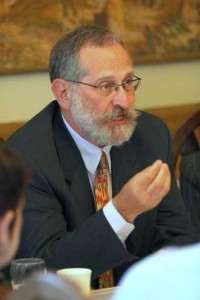
Mel Cappe spent more than 30 years in the Canadian public service, most recently as the High Commissioner for Canada to the United Kingdom of Great Britain and Northern Ireland. He served in a number of senior policy positions, was Canada’s top public servant as Clerk of the Privy Council, and has been Special Advisor to Prime Minister Jean Chrétien. Since 2006, he has served as President of the Institute for Research on Public Policy. He will be participating in the McGill Institute for the Study of Canada’s 2009 conference, Public Policy in Crisis? Understanding Policy-Making in Canada, on March 26 and 27.
Q: In your experience, what is the most common source of new public policy ideas?
It used to be that research branches of political parties and platforms were the source of ideas. That is less and less the case as they now focus on Question Period. That is a non-partisan critique, as it applies to all parties. The public service has a responsibility to be attuned to ideas from all sources — academe, NGOs, think tanks, and interest groups — and most importantly, to generate ideas themselves. (It won’t surprise you that I think the role of think tanks is increasingly significant.) Analysis and research should be the foundation for problem identification and policy solutions.
What is the biggest obstacle standing between an innovative policy idea and its implementation?
Lack of analysis, lack of simplification, and lack of complexity. You will have to attend the conference to get the full answer.
At the conference, you will sit on a panel discussing policy-making in times of crisis. The recent financial crisis has caused governments around the world to quickly cobble together important fiscal policy. Do such crisis situations help or hinder the policy-making process?
Rahm Emanuel, Chief of Staff to President Obama, has been quoted as saying it would be a shame to let a crisis go to waste. They stimulate creativity and thus help. But it helps to have thought about these things first. Officials who have background studies and innovative policy solutions in their bottom drawers help nourish the policy process in response to crises. It is not unhappy that Ben Bernanke did his PhD on the Great Depression. It is depressing that no one had anticipated 9/11. The policy response to such crises requires care, discipline, and thoughtfulness. We have the luxury in Canada of being more measured in our response to such crises. We did not overreact to Enron as the U.S. Sarbanes-Oxley regulations did.
Which matters more to policy-makers: scientific evidence or public opinion polls?
I am increasingly concerned about policy-based evidence as opposed to evidence-based policy…as it should be done. The role of analysis and research as a foundation for good policy is fundamental. Unfortunately, I fear it is honoured too often in the breach. As a small-d democrat, when someone says that decision was just “political,” I defend it. Politics is good. But good policy should make good politics.
